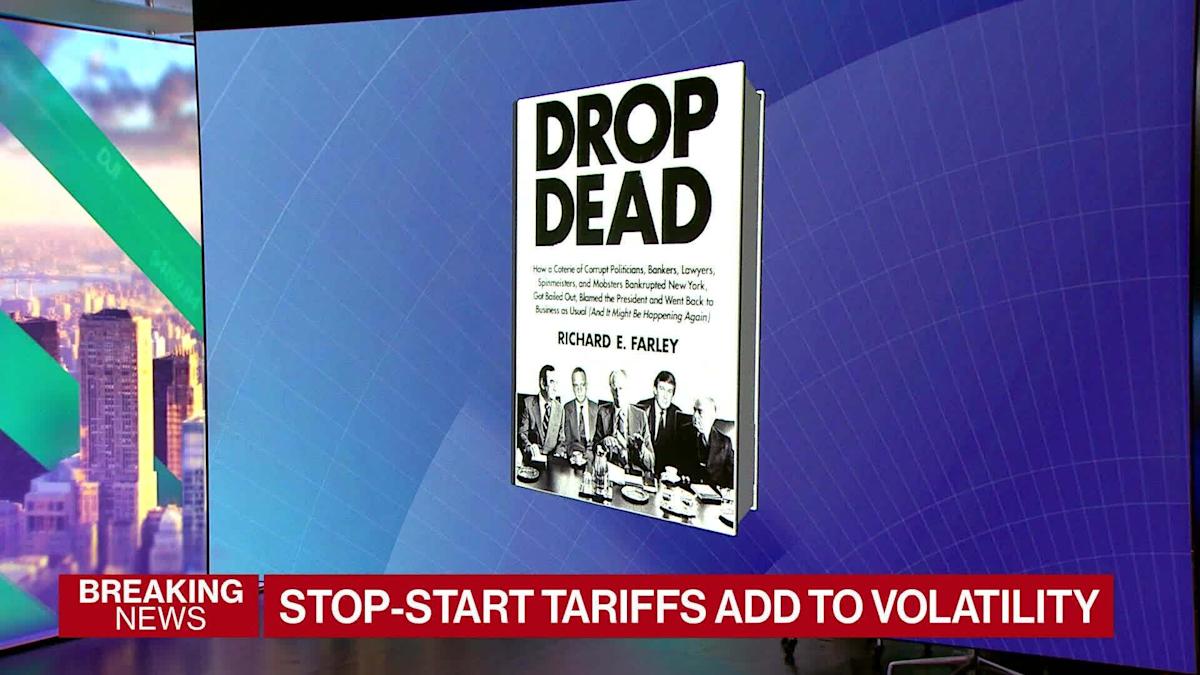(Bloomberg) — Stocks rose amid wild gyrations as the intensifying US-China trade spat threatens turmoil across the global economy and the financial system. Bonds sank alongside the dollar, with fear continuing to grow that foreign investors are beating a retreat from American assets.
Most Read from Bloomberg
Volatility shows little signs of abating, with concerns that President Donald Trump’s fast-evolving trade policy not only is shaking the globe but threatening the US status as the world’s safe haven. Equity convulsions have unsettled traders, with the S&P 500 up 1% after earlier falling about as much. Longer-dated US yields headed toward their biggest weekly surge since the 1980s, with concerns over economic growth driving the greenback to a fresh six-month low.
Not since the Covid-19 pandemic has there been this little clarity on what the outlook for economies and earnings will look like, with financial markets descending into chaos, China unleashing retaliatory measures and the US president pausing some levies only hours after they took effect.
Subscribe to the Stock Movers Podcast on Apple, Spotify and other Podcast Platforms.
Investors should sell any rallies in the S&P 500 until the US and China de-escalate the global trade war and the Federal Reserve steps in, according to Bank of America’s Michael Hartnett.
The strategist said tariffs and the resulting market turmoil were turning US exceptionalism into “US repudiation.” He recommends a short position on stocks — until the S&P 500 hits 4,800 points — and a long bet on two-year Treasuries. The guage traded around 5,340 Friday.
Higher bond yields, lower stocks and a weaker dollar are “driving global asset liquidation, will likely force policymakers to act,” Hartnett wrote in a note. But investors should “sell the rips in risk assets.”
“The US markets are not trading in the last couple weeks, like their traditional developed safe-haven status,” said Phillip Colmar at MRB Partners. “They’re trading more like a weak emerging-market country. We’re seeing the dollar really slide, and we’re seeing the bond market get threatened here.”
Friday brought a fresh signal that consumers were queasy even before Wednesday’s policy shift, with a plunge in sentiment as inflation expectations soared to multi-decades highs.
Story Continues
With tariffs at levels now set to halt most trade between the world’s biggest economies, the concern now is that the economic fight could spill into other areas. China retaliated against Trump’s latest tariffs by hiking duties on all US goods, while calling the administration’s actions a “joke” and saying it no longer considers them worth matching.
As China hiking duties on all American goods, shares of chipmakers with US manufacturing plummeted. Tesla Inc. stopped taking orders in China for Model S sedans and Model X sport utility vehicles — both of which are imported from the US. Meantime, JPMorgan Chase & Co.’s stock traders took in a record haul, boosted by chaotic market moves set off by policy announcements.
JPMorgan Chief Executive Officer Jamie Dimon said he expects “a kerfuffle” in the Treasury market that prompts a Federal Reserve intervention.
“There will be a kerfuffle in the Treasury markets because of all the rules and regulations,” Dimon said Friday on an earnings call. When that happens, the Fed will step in — but not until “they start to panic a little bit,” he added.
US stocks have plunged 7% since Trump announced plans to ramp up tariffs on dozens of countries on April 2. Since then, rather than tumble, 30-year yields have actually risen around 40 basis points, only the fifth time in data going back to the 1970s that moves of this magnitude have occurred simultaneously.
“US bond market behavior has been the most worrisome part of price action this week,” said Ajay Rajadhyaksha of Barclays Plc. “Until Treasuries stabilize and start to behave normally, risk assets will struggle, in our view.”
After a week of wild swings in the bond market, China’s holdings of Treasuries are increasingly under scrutiny from analysts around the world.
Some have gone as far as suggesting — without hard evidence — that sales by Beijing may have helped fuel the biggest surge in 30-year yields since the pandemic and subsequent volatility. Others debate whether China might turn to dumping US debt in the future as a response to the steepest American tariffs in a century
Some of the main moves in markets:
Stocks
-
The S&P 500 rose 1.2% as of 12:37 p.m. New York time
-
The Nasdaq 100 rose 1.3%
-
The Dow Jones Industrial Average rose 1%
-
The MSCI World Index rose 0.9%
Currencies
-
The Bloomberg Dollar Spot Index fell 0.7%
-
The euro rose 0.7% to $1.1284
-
The British pound rose 0.6% to $1.3044
-
The Japanese yen rose 0.4% to 143.93 per dollar
Cryptocurrencies
-
Bitcoin rose 3.6% to $82,726.1
-
Ether rose 2.6% to $1,569.67
Bonds
-
The yield on 10-year Treasuries advanced seven basis points to 4.50%
-
Germany’s 10-year yield declined one basis point to 2.57%
-
Britain’s 10-year yield advanced 11 basis points to 4.75%
Commodities
-
West Texas Intermediate crude rose 1.3% to $60.88 a barrel
-
Spot gold rose 1.8% to $3,233.15 an ounce
–With assistance from Robert Brand, Julien Ponthus and Anand Krishnamoorthy.
Most Read from Bloomberg Businessweek
©2025 Bloomberg L.P.
